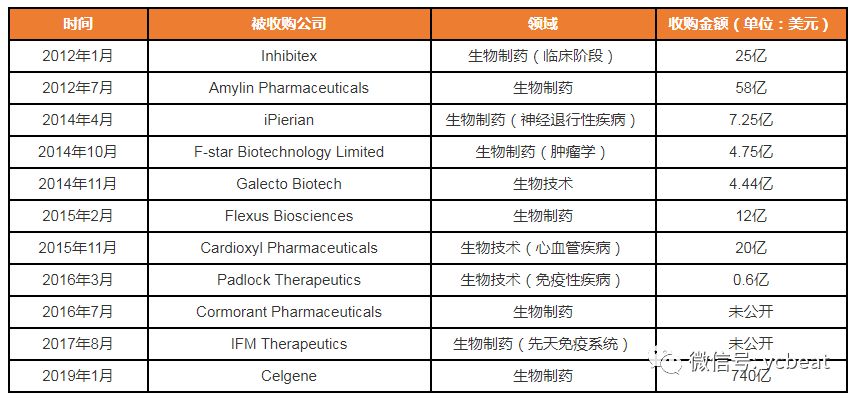Recently, Arterial Network learned from foreign media information that Bristol-Myers Squibb (BMS) announced that it will acquire Celgene in a total of $74 billion in cash and stock. The merger of the two leading global anticancer drug manufacturers opened the curtain of mergers and acquisitions of biopharmaceutical companies in 2019, becoming one of the largest mergers and acquisitions of pharmaceutical companies in history.
According to a statement issued by the two companies on January 3, local time in the United States, each share of the new base shareholders will receive a stock of Bristol-Myers Squibb plus $50 in cash, and will be able to obtain the expected value of $9 in cash in the future ( CVR). Accordingly, the new base is valued at $102.43 per share, which is 54% higher than the closing price on January 2. The new base price soared more than 30% before the New York market, reaching 88.82 US dollars / share, Bristol-Myers Squibb once fell more than 16%, down to 44 US dollars / share.
After the merger of the two companies, the original shareholders of Bristol-Myers Squibb will hold a 69% stake in the new company, and the original shareholders of Xinji will hold a 31% stake in the new company.
The acquisition of the new base will enable Bristol-Myers Squibb to acquire a number of pipeline assets with significant potential in the fields of cancer, immunity and inflammation, including TYK2, ozanimod, luspatercept, liso-cel (JCAR017), bb2121, fedratinib, etc. Revlimid, one of the most successful anticancer drugs in recent years, is also included.
The drug is a star drug under the new base and is the first-line drug for multiple myeloma. In 2017, Revlimid's sales were close to $8.2 billion, ranking second in the global top-selling list of TOP10. The sales of new-based pharmaceuticals were mainly from Revlimid.
For the acquisition of New Base Pharmaceuticals, Bristol-Myers Squibb CEO Giovanni Caforio said the acquisition will take the company to a new stage of development. The combined company will have nine drugs, each with annual sales of more than $1 billion. The company will also have a broader pipeline of drug development, including six drugs that may be launched in the next one to two years, which may bring $15 billion in revenue to the company.
Bristol-Myers Squibb with its own expansion gene
Bristol-Myers Squibb is a global biopharmaceutical company with the mission of “Developing and Delivering Innovative Drugs to Help Patients Fight Severe Diseasesâ€, headquartered in New York, and its predecessor was Clinton Pharmaceuticals, founded in 1887.
In 1898, the company changed its name to Bristol, Myers Company (hereinafter referred to as Bristol-Myers). In 1900, the company was registered as a joint-stock company and shifted its focus to the wholesale and retail of pharmaceuticals, which has since grown rapidly.
In 1924, the total profit of Bristol-Myers reached 1 million US dollars for the first time, and its products were sold to 26 countries. In 1929, the company was successfully listed in New York. In the 1940s, Bristol-Myers Merger launched a large-scale merger: Clairol, a wig manufacturer in 1959, Drackett, a home-based product manufacturer, Zimmer, a surgical product manufacturing company, and Unitek, a dental product manufacturer, in 1978. Wait.
Large-scale acquisitions have expanded the business scope of Bristol-Myers and added product development pipelines. Between 1974 and 1980, the company had 11 new anticancer drugs on the market, earning $200 million in profits. In 1986, Bristol-Myers merged with GSC, a biotechnology company's genetic systems company. During this period, Bristol-Myers has also achieved outstanding market position in the treatment and control of AIDS.
Squibb's doctor-born Edward Robinson Squibb was founded in New York in 1856, which produces pure ether. In 1905, Squibb’s son sold the company to the founder of Merck, Theodore Wick. Between 1909 and 1929, the company's annual sales soared from $414,000 to $130 million.
In 1946, Bristol-Myers Squibb expanded to Latin America, Europe and other countries, and established manufacturing facilities in Mexico, Italy and Argentina. In 1971, the company changed its name to Squibb Co., Ltd. In 1975, the company had annual sales of $1 billion.
In 1989, Bristol-Myers Meyer and Squibb Inc. merged to form the current Bristol-Myers Squibb, with a combined valuation of $12.7 billion.

Image courtesy of statnews official website
It can be said that Bristol-Myers Squibb has its own expansion gene since its establishment. The company's development history is also a history of corporate expansion. In recent years, although Bristol-Myers Squibb has become a giant in the bio-pharmaceutical industry, it still does not forget to seek business and scale expansion.
According to public information, in recent years, Bristol-Myers Squibb has conducted 20 corporate acquisitions. Among them, since 2012, Bristol-Myers Squibb has acquired dozens of companies including clinical biopharmaceutical company Inhibitex, oncology drug company F-star Biotechnology Limited and Swedish biotechnology company Galecto Biotech. The largest transaction amount was the recent acquisition of Xinji Pharmaceutical Co., Ltd. for US$74 billion.

The chart is a brief history of the acquisition of Bristol-Myers Squibb since 2012
Smart Door Lock,Smart Security Door Locks,Fingerprint Smart Door Lock,Electronic Key Card System Smart Lock
Shenzhen Bio Technology Co., Ltd , https://www.huifantech.com